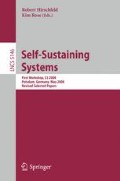Abstract
Programming languages often hide their implementation at a level of abstraction that is inaccessible to programmers. Decisions and tradeoffs made by the language designer at this level (single vs. multiple inheritance, mixins vs. Traits, dynamic dispatch vs. static case analysis, etc.) cannot be repaired easily by the programmer when they prove inconvenient or inadequate. The artificial distinction between implementation language and end-user language can be eliminated by implementing the language using only end-user objects and messages, making the implementation accessible for arbitrary modification by programmers. We show that three object types and five methods are sufficient to bootstrap an extensible object model and messaging semantics that are described entirely in terms of those same objects and messages. Raising the implementation to the programmers’ level lets them design and control their own implementation mechanisms in which to express concise solutions and frees the original language designer from ever having to say “I’m sorry”.
Access this chapter
Tax calculation will be finalised at checkout
Purchases are for personal use only
Preview
Unable to display preview. Download preview PDF.
References
Chambers, C., Ungar, D., Lee, E.: An efficient implementation of SELF a dynamically-typed object-oriented language based on prototypes. In: OOPSLA 1989 Conference proceedings on Object-oriented programming systems, languages and applications, pp. 49–70. ACM Press, New York (1989)
Deutsch, L.P., Schiffman, A.M.: Efficient implementation of the Smalltalk-80 system. In: POPL 1984: Proceedings of the 11th ACM SIGACT-SIGPLAN symposium on Principles of programming languages, pp. 297–302. ACM Press, New York (1984)
ECMA. Ecmascript language specification (December 1999), http://www.ecma.ch/ecma1/stand/ecma-262.htm
Goldberg, A., Robson, D.: Smalltalk-80: the language and its implementation. Addison-Wesley Longman Publishing Co., Inc., Boston (1983)
Kiczales, G., des Rivieres, J., Bobrow, D.G.: The art of metaobject protocol. MIT Press, Cambridge (1991)
Kiczales, G., Paepcke, A.: Open Implementations and Metaobject Protocols, http://www2.parc.com/csl/groups/sda/publications/papers/Kiczales-TUT95/for-web.pdf
Lieberman, H.: Using prototypical objects to implement shared behavior in object-oriented systems. In: OOPLSA 1986: Conference proceedings on Object-oriented programming systems, languages and applications, pp. 214–223. ACM Press, New York (1986)
McCarthy, J.: LISP 1.5 Programmer’s Manual. The MIT Press, Cambridge (1962)
Piumarta, I.: Efficient Sideways Composition via ‘Lieberman’ Prototypes. VPRI Research Memo RM-2007-002-a (2007), http://vpri.org/pdf/lieberman_proto_RM-2007-002-a.pdf
Sankar, S., Viswanadha, S., Solorzano, J.H., Duncan, R.J., Bacon, D.J.: Mixed-mode execution for object-oriented programming languages. US Patent 6854113, issued February 8 (2005), http://www.patentstorm.us/patents/6854113.html
Schärli, N., Ducasse, S., Nierstrasz, O., Black, A.: Traits: Composable units of behavior. In: Cardelli, L. (ed.) ECOOP 2003. LNCS, vol. 2743, pp. 248–274. Springer, Heidelberg (2003)
Ungar, D., Smith, R.B.: Self: The power of simplicity. In: OOPSLA 1987: Conference proceedings on Object-oriented programming systems, languages and applications, pp. 227–242. ACM Press, New York (1987)
Ungar, D., Spitz, A., Ausch, A.: Constructing a metacircular virtual machine in an exploratory programming environment. In: OOPSLA 2005: Companion to the 20th annual ACM SIGPLAN conference on Object-oriented programming, systems, languages, and applications, pp. 11–20. ACM Press, New York (2005)
Author information
Authors and Affiliations
Editor information
Editors and Affiliations
Rights and permissions
Copyright information
© 2008 Springer-Verlag Berlin Heidelberg
About this paper
Cite this paper
Piumarta, I., Warth, A. (2008). Open, Extensible Object Models. In: Hirschfeld, R., Rose, K. (eds) Self-Sustaining Systems. S3 2008. Lecture Notes in Computer Science, vol 5146. Springer, Berlin, Heidelberg. https://doi.org/10.1007/978-3-540-89275-5_1
Download citation
DOI: https://doi.org/10.1007/978-3-540-89275-5_1
Publisher Name: Springer, Berlin, Heidelberg
Print ISBN: 978-3-540-89274-8
Online ISBN: 978-3-540-89275-5
eBook Packages: Computer ScienceComputer Science (R0)

